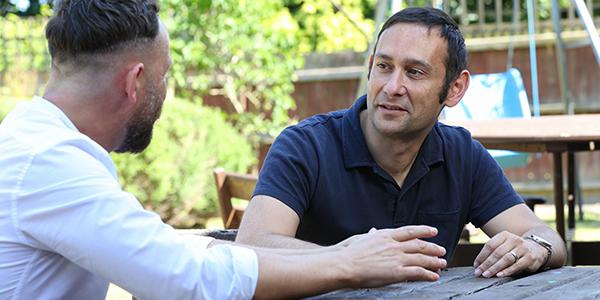Permission to be yourself at work
In this blog, our chief executive Richard Kramer talks about vulnerability, being yourself at work and what that looks like in the time of Covid-19.

Appreciation. Authenticity. Compassion. Being Vulnerable. Bringing your whole self to work. Sharing your gifts, your talents, your doubts, your insecurities, your heart and soul, the things that matter to you. These attributes are seen as important in the context of leadership, teamwork and success. Colleagues feel like they know who you are and what you are about.
We are taught that if we want to bring about change, it must come from within and from how we relate to ourselves. As leaders, we then need to role model that change. However, since Covid-19, change has come about from external forces with the environment completely shifting around us. The collective trauma of 2020 has provided that catalyst for change. It has changed our internal processes, assisted us to generate new ways of thinking and try out new behaviours.
The constraints of being yourself at work
Pre-Covid-19, we agonized whether work could ever be an authentic environment. When we are growing up, ‘just be yourself’ is a constant refrain. It sounds like the best advice until we are at the office. We have work rules, norms and routines, policies and procedures, do’s and dont’s that are part of the fabric of any organisation. It’s the ‘way we do things around here’. Things are stacked against you.
We wear different clothes. We sit in the same seat every day. We have awkward watercooler chats. We are painfully aware of work boundaries. We do our best to blend in and fit with others. We worry what colleagues think of you. We feel hurt if we don’t get the support from colleagues. We know the importance of holding back and controlling your own emotions.
Work seems like an inauthentic place to spend so much of our time.
We have all opened up since the pandemic
This year, the boundaries between work and home have become blurred. We have all started to reveal more of our real selves at work, with virtual meetings as the ultimate leveller. Suddenly, we are all at the top of the Tate Modern’s 360-degree viewing platform peering into people’s homes, staring and waving at them.
Our colleagues might opt to switch off their cameras, the equivalent of drawing their blinds, but in the main sharing a bit of your home life is the new 2020 pastime. We even take screenshots to mark group discussions, bizarrely, the equivalent of taking photographs of each other in meetings. The impact is far-reaching. Virtual meetings are here to stay and agile working between work and home is a permanent change. We will also value how staff will need a more flexible work schedule to care for their family.
Many of our day to day conversations have been bleak. We have grappled with our response to the pandemic, making difficult decisions around furlough, cuts backs, trying to meet increased demand for our services with reduced resources. We have consciously and deliberately carved out new conversations to distract from the heavy burden that has dominated our lives.
We are more open with one another in a way we wouldn’t never had done. We are more willing to learn more about our colleagues. There have been less awkward chats. No watercoolers. Less formal work clothes.
Instead, we have quietly encouraged people to express themselves through the clothes they choose to wear. We have seen new sides to people and are learning new things from each other. We have also found the time to have fun. For example, one of our directors led a cooking class for other executive team colleagues.
Covid-19 has given us permission to be ourselves.
We are more open about our vulnerabilities
This pandemic has created an environment that is more conducive to authentic and humane ways of working.
We have experienced a shared challenge. It has had a lasting impact. Our lives have changed. We have all collectively felt anxious and insecure. We are all human and have all experienced good days and bad days. Asking ourselves if we have done the right thing and made the right decisions?
We have been more open about talking about our vulnerabilities. We have all felt vulnerable as we have needed to take different risks, speak up, ask for help, and connect with others in a genuine and safe way. We have also told our colleagues, more than ever, that we value, recognise and appreciate them for what they do and who they are. We have all got a little more used to being vulnerable as individuals, as teams, as organisations. With that comes a collective understanding that the bad days are what makes us stronger.
Covid-19 has taught us that it is safe to be ourselves and not hold back so much. And of course, when people are encouraged to be their best selves at work, they are more productive in work.
Are there any limitations to bringing your whole self to work?
On social media, many leaders have talked openly and honestly and with deep integrity about the challenges they have faced, including their personal struggles and the difficult decisions that they have had to take as they respond to events outside their control. I have also seen leaders rightly take a brave stand about social justice issues, such as tackling inequalities or addressing poverty.
When we talk to our own organisation, our values tend to align with our colleagues. But when we comment on social media, we are talking to a wider audience, with a greater diversity of views. It follows that being your whole self on social media carries risks and has a downside. When leaders express their personal views on, for example, Brexit or the government’s overall handling of the pandemic, they risk being seen as partisan in their thinking. We then shouldn’t act surprised if our views then don’t sit comfortably with others. And of course, many people on twitter won’t make a distinction between your comments made in a personal capacity and statements made as a leader of your organisation.
Secondly, bringing your whole self to work doesn’t mean that you should reveal everything about your life to colleagues. It’s okay if what colleagues see on the surface is still a relatively small part of your entire life.
It doesn’t follow that private people (like me) are: less authentic, have separate work and home personas, or don’t acknowledge our own vulnerabilities.
I feel humbled to lead such a unique charity. I am surrounded by teams that know more about their areas of expertise than me. I try and communicate and connect with others as much as possible. I call on their support and leadership. I acknowledge when I don’t always get it right. I make mistakes. I hope that makes me a better leader.
We recognise that we aren’t going to go back to the old ways of working or old behaviours any time soon. Let’s instead embrace bringing our whole selves to work.

